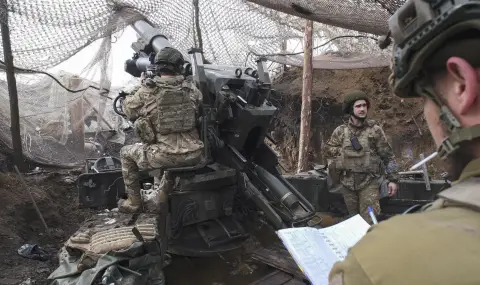Two senior members of Russian President Vladimir Putin's inner circle have reiterated the non-negotiable demands of June 2024. Among them is the requirement that any resolution of the war in Ukraine must lead to regime change, territorial concessions and long-term restrictions on the Ukrainian army, News.bg reports.
This became clear after the meeting of the US special envoy for the Middle East, Steve Witkoff, with Putin on April 11.
The head of the Russian Foreign Intelligence Service, Sergei Naryshkin, said on April 15 that any future peace agreement must include conditions regarding Ukraine's neutrality, demilitarization and "denazification" of the Ukrainian state, the abolition of Ukrainian laws that allegedly discriminate against Russian speakers in Ukraine, and the recognition of Russia's illegal annexation of the Luhansk, Donetsk, Zaporizhia and Kherson regions.
This was reported by the Institute for the Study of War (ISW).
Russian Foreign Minister Sergei Lavrov told the Russian state-owned business newspaper "Kommersant" on April 14 that the current Ukrainian government is "unconstitutional" and that Russia "cannot give up on Russian speakers living in occupied Ukraine", following the controversial referendums that Russia held in the four regions in the fall of 2022.
Lavrov reiterated that Putin "very clearly outlined" the demands during his speech on June 14, 2024, and stated that they were "not" any demand". Lavrov stressed that there were "no secrets" about Russia's demands and reiterated the importance of addressing the "root causes" of the war in a future peace agreement.
On 14 June 2024, Putin demanded that Ukrainian forces "completely withdraw" from Ukrainian-controlled territory in Donetsk, Luhansk, Zaporizhia and Kherson regions and said that Ukraine should formally abandon its goal of joining NATO (by amending its constitution, which enshrines this goal).
Russia demands in the protocol that the Ukrainian army be limited to fewer than 85,000 active-duty servicemen, fewer than 15,000 National Guard personnel, and fewer than 1,400 tanks and armored vehicles. The Ukrainian army before 2022 there were 196,600 active duty personnel, 60,000 National Guard personnel, and over 3,000 tanks and armored vehicles.
Ukraine must cede occupied Ukrainian territory and "Novorossiya" to Russia. Putin stated on June 14, 2024, that Russia would not be satisfied with ending the war on the lines it currently holds, and explicitly called on Ukrainian forces to withdraw from the unoccupied parts of Donetsk, Luhansk, Kherson, and Zaporizhia regions as a prerequisite for any "peaceful" negotiations with Ukraine.
The Kremlin views independent countries that were once colonized by the Soviet Union and the Russian Empire as legally part of modern Russia.
Moldova and NATO countries such as Estonia, Latvia, and Lithuania were part of the Soviet Union and the Russian Empire, while NATO member Finland and large parts of Poland were part of the Russian Empire.
Russian presidential aide and former Security Council secretary Nikolai Patrushev recently threatened Finland using narratives similar to those the Kremlin used to justify its invasion of Ukraine.
Putin and other Russian officials are trying to use Russia's past colonization efforts to set information conditions and justify future aggression against NATO countries.
Naryshkin has threatened a Russian attack on NATO countries that are building up their defenses in line with U.S. President Donald Trump's insistence that Europe increase its own defense capabilities. Naryshkin said on April 15 that NATO countries were strengthening their positions on their borders with Belarus and Russia, including Russia's Kaliningrad region.
Poland and the Baltic states "must understand" that "the first victims" in the event of "NATO aggression" against the allied state of Russia and Belarus will be them.
Naryshkin argued that European countries, such as France, Britain and Germany, are escalating the war in Ukraine, so Russia "must act preemptively" and "is ready for it."
Russian officials, including Putin, have repeatedly threatened NATO in 2023 and 2024.
Lavrov tried to blame Ukraine for the lack of a full ceasefire, claiming that Ukraine "loves to lie."
Russian officials, led by the Russian Ministry of Defense (MOD), have accused Ukraine of violating the temporary ceasefire on energy infrastructure almost every day since March 29, without offering any evidence of such violations. The Kremlin appears to be using these unsubstantiated allegations to dismiss Trump’s proposal for a temporary full ceasefire.
Ukrainian President Volodymyr Zelensky noted on April 14 that Ukraine had accepted Trump’s proposal for a temporary full ceasefire more than a month ago.
